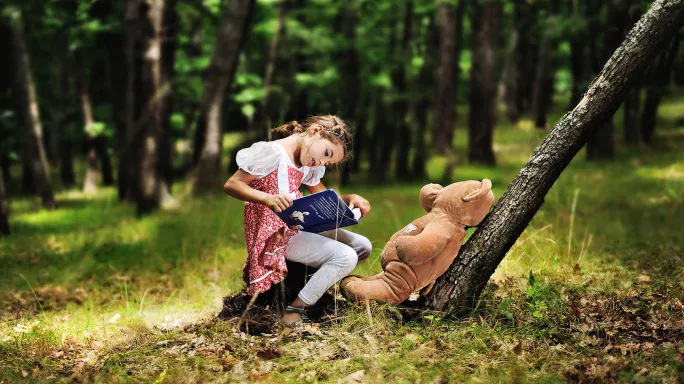- Home
- Tell it like a story if you want pupils to learn
Tell it like a story if you want pupils to learn

Can you tell me the story of Red Riding Hood?
How about Goldilocks and the Three Bears or The Three Little Pigs?
I suspect you could. I know I can, and I haven’t heard any of those stories for years, possibly decades.
Stories stick. And not just stories from our childhood. I could give a fair summary of The Historian by Elizabeth Kostova or The Shadow of the Wind by Carlos Ruiz Zafón, despite having read them a few years ago.
Quick read: Five steps to improve teacher explanations
Quick listen: Why you have got direct instruction wrong
Want more articles like this? Join our Tes Teaching and Learning Facebook group
And yet, just yesterday, I was reading the fascinating book Powerful Pedagogy by Ruth Powley and, despite nodding along and thinking “this all makes a lot of sense”, I’d be hard pushed to give you a chapter by chapter breakdown in the same way.
Why is this?
Storytime
Well imagine Red Riding Hood had been presented to you as a child as a list of facts, would you still be able to recall them years later?
-
Wolves have big eyes for seeing you with
-
Children are sent into the forest with food for elderly relatives
-
Woodcutters work in the forest
-
Wolves sometimes creep into beds and wait for people
I suspect the answer is no.
So what is it about stories that makes them so much more memorable? And can we use whatever it is in our classrooms?
Power of narrative
The “psychological privilege of stories”
Andy Tharby, in his book How to Explain Absolutely Anything to Absolutely Anyone, expands on the idea put forward by professor Daniel T Willingham that stories are “psychologically privileged”.

He suggests that as our language and culture evolved we learnt to make use of stories as a way of sharing important information. Both Tharby and Willingham suggest that this is because stories share certain characteristics that make them easy to store and easy to retrieve.
1. Puzzle power
Firstly. stories are interesting. At the heart of every story, there is a puzzle that needs to be solved and we can enjoy working out the conclusion.
Stories also tend to omit bits of information at the time of telling and our brains have to fill in the gaps. This means we are thinking about the information we are given and, as Willingham says, “memory is the residue of thought”.
2. Easily consumed
Secondly, stories are easy to understand. There is a format they follow and our brains don’t have to think about the structure of the task. In my previous article, ”How to get every pupil focused on learning”, I suggested that when pupils have to think about the structure of the task they aren’t concentrating on the lesson we are trying to teach.
Stories work in a way that makes sense to us and we don’t have to focus on the format. This is why we can get lost in a book.
3. They connect information
Finally, stories are easy to remember because there is a clear sense of cause and effect. One thing happens because of another thing and it leads to the next. If we can remember one part of the story, that part triggers memories of what happens before and after.
For example, if we remember that the Wolf awaits Red Riding Hood in the bed we will remember (spoiler alert!) that the Wolf has just devoured Grandmother and that Red is in mortal danger.
From book to classroom
This is all very well, but few of us are teaching pupils to remember stories, so how does this help us?
One thing we can do is to start seeing the stories inherent in our subjects. Stories transcend fiction. As David Didau explains in Making Kids Cleverer, “Almost everything we encounter we repackage as a story - scientific discoveries, news events, love affairs, the broad sweep of history. It is all grist to our mental story mills.”
All stories, whether fictional or not, are based on 4 Cs.
-
Causality
-
Conflict
-
Complications
-
Character
We can use these to structure as stories the information we want pupils to learn.
Tell it like a story
For example, I want pupils to understand the impact of tropical storms and to be able to use an example to typify this. I could provide them with a list of information about Typhoon Haiyan and ask them questions about it or, first, I could turn the events of that day into a story.
We have a classic tale of man vs nature. The character of Haiyan itself forming over the tropical waters of the Pacific Ocean, moving inexorably closer to The Philippines and the city of Tacloban. There we can pick up one character and show how he tries to prepare for the coming storm, but show the devastation, the complications, he has to deal with as he evacuates the city.
Here we have clear causality (the event happened because of this preceding event); a character, behind whose eyes we can see it unfold; complications to overcome that give the brain something to think about and a reward for solving; and a clear conflict driving the story on.
Better recall
After hearing the tale of Haiyan, the class can apply it to answer questions on its cause and effect and draw out the wider implications. A dry list of facts about a storm that would be hard to learn has become psychologically privileged through its transformation into a story.
Storytelling telling brings our subjects alive and leaves a lasting impression in a way we can all make use of.
And they all live happily ever after.
Mark Enser is head of geography and research lead at Heathfield Community College. His first book, Making Every Geography Lesson Count, is out now
Further reading
- EEF report on metacognition
- The power of storytelling
- Why teachers need to talk better, not less
Keep reading for just £1 per month
You've reached your limit of free articles this month. Subscribe for £1 per month for three months and get:
- Unlimited access to all Tes magazine content
- Exclusive subscriber-only stories
- Award-winning email newsletters



